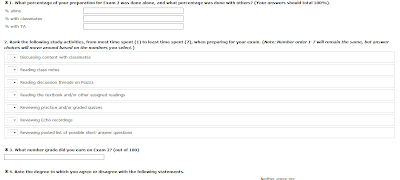Wednesday, July 31, 2013
Exam Wrappers
One of the most significant additions to my Spring 2013 flipped class was exam wrappers. These were relatively short surveys, posted on Survey Monkey, with questions designed to induce the students to review their exams; reflect on their preparations and study strategies; and think about how they might address any deficiencies in their performance. They were also intended to encourage students to recognize the role that some of the graded and ungraded formative assessments played in preparing them for the exam.
We returned the graded exams one week after they were taken and posted the exam wrapper. Students had a week to do the exam wrapper and received 2 extra credit points on the subsequent exam. As well, if they did ALL of the surveys during the semester (there were a lot since we were trying to learn as much as possible about their learning), they received two points added to their final grade.
The exam wrapper for Midterm #2 can be found here (just enter random numbers for the ID info and click next to see the questions; here are some other examples on the Carnegie Mellon Eberly Center site). These were created by an assessment specialist at UT Austin's Center for Teaching and Learning, Dr. Stephanie Corliss. I reviewed them and made small suggestions. The point of the exercise was a. to encourage students to pick up their exam and look at it; b. to have to spend even five minutes thinking about how they studied and, hopefully, recognize for themselves what strategies worked and didn't work; and c. to remind them of all the different learning tools available to them to prepare for the exam (practice quiz questions, recorded lectures, etc.)
What most surprised me about the exam wrappers was the extent to which they did my job for me, but far more effectively. Normally, I would offer a short review of the class performance on the exam and then talk about common problems. As well, with each exam, I would point out to them ahead of time ways that the content might post particular challenges or require particular approaches to mastery. Between the weekly quizzes and the exam wrappers, however, I found that the students were largely able to self-regulate and self-correct. Semester after semester, I have told classes that cramming for my exams is not a particularly effective strategy, particularly for exams 2 and 3. This went in one ear and out the other. But when these students saw these difficulties crop up in small doses on their weekly quizzes, they adjusted on their own. Likewise, when I read through their comments on the exam wrappers, it was absolutely clear that they had identified the sources of trouble for themselves. Sometimes it was too little preparation; more often, though, they had important insights into how their preparation strategies were wrongheaded; and a clear and effective plan for adjusting them.
I have also used exam wrappers in graduate seminars to extremely good effect, particularly in a class that focuses on improving students' abilities to read large amounts of Latin quickly. They instill in students a habit of self-reflection and self-regulation. They encourage students to see midterm exams (or quizzes) as formative assessments, as offering feedback on their learning strategies. Most importantly, they remind students of the resources available to them to learn the course material; and emphasize that there is still time to make adjustments and improve their performance. I expected my graduate students to become more reflective learners. I was, quite frankly, very surprised to see how effective the exam wrappers--together with the weekly quizzes--were at helping my undergraduates to reflect on their learning strategies and make appropriate adjustments. These adjustments were clear in their grades, as they improved even as the difficulty level of the course increased.
Subscribe to:
Post Comments (Atom)


No comments:
Post a Comment